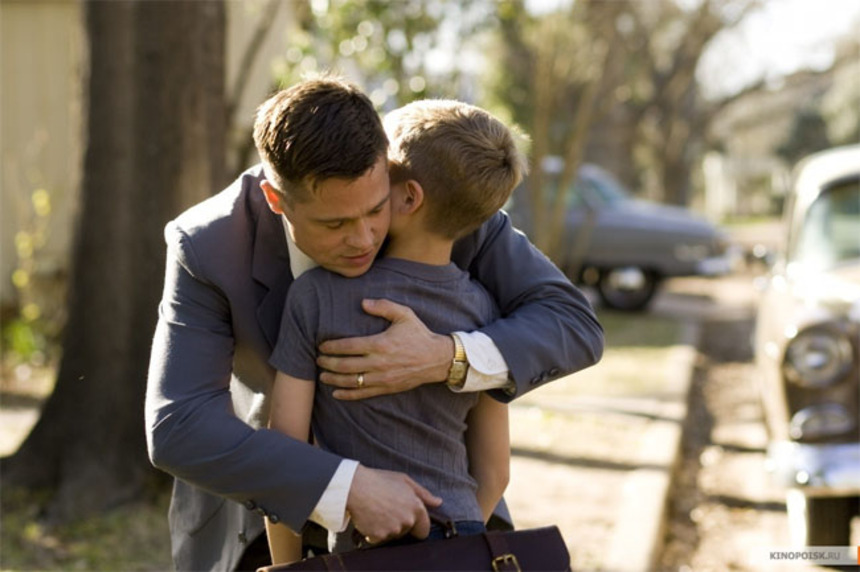THE TREE OF LIFE Review

[In light of The Tree of Life opening in Canadian cinemas this weekend, here is one of our previous reviews of the 2011 Cannes Palm D'Or winner]
The Tree of Life is a collection of the wondrous memories of childhood, when we look up at everything (for we are smaller than everything else and must crane our necks). The film spends a lot of time with the camera on the ground and the sun peaking into the frame in one fashion or another. The three O'Brien brothers grow up in the white picket fences, big cars and endless summers of the 1950s. Baseball, running through the wilderness unsupervised and blowing up frogs round out their days. In between this wild abandon is the discipline imposed by their father and the ethereal fragility of their mother who offers love silently. There are scenes when the boys bear witness to a man being arrested and also attend the funeral of a friend who drowns. There are attempts, to parse what (and why) violence occurs and what (and why) is pain woven into life, yet mainly they do as children do: move through events with a playful ignorance, the effects of bearing witness come out in other ways. These are the images and experiences that wedge themselves in your brain and linger on into adulthood. The film spends most of its time with Jack O'Brien, the eldest child of three played with nuance (and screen presence) by Hunter McCracken as a child of about 10 and by Sean Penn as an older man who is still coming to grips with his father and his childhood. His eventual awakening to (and rebellion from) the man his father is, is the backbone of the film. A struggle.
Jessica Chastain's Mrs. O'Brien is much more of an enigma; she is both Pocahontas and The Naturals from The New World; she is Gaia, Earth Mother. Through the lens of the 21st century, she often appears to suffer at the hands of her dominating husband, but she also seems to be the more successful one in drinking in life for the suffering. The dynamic of the family in The Tree of Life is remarkably similar to the structure of Malick's previous film. Pitt is the aggressive (and slightly clueless) settlers (as in Christopher Plummer and David Thewlis.) Jack is Captain Smith, caught in the middle, absorbing elements of both, alone nonetheless. If I belabor the comparison it is because the relative isolation of the O'Brien clan (seemingly absent of extended family or friends in the film) underscores something in all of Malick's films. That he eschews the social aspects of humanity to tell his stories. We are alone, maybe with a companion for a while, but it is fraught with miscommunication and dysfunction. Consider Martin Sheen and Sissy Spacek in Badlands, or Richard Gere and Brooke Adams in Days of Heaven. While there is the platoon in The Thin Red Line, ultimately with Malick's signature voice-over narrations, you realize that these men are alone with their thoughts while engaged in war.
The director's willful removal of the mundane for the poetic, achieves profundity from the nostalgic. Nobody talks about the weather, or attends to back-yard BBQ chit-chat in a Malick film, human interaction plays more like memory than the present mundane, perhaps a reason why nearly all of his films are set in the past. Shots of nature, the universe, and yes, CGI dinosaurs, along with the struggles of the O'Briens are a connected series of simple, yet awesome (in the proper definition of the word) images. There is a sense of the tactile merely by watching Chastain wash her feet, or Pitt extract weeds from his lawn, this is a powerful enough effect (even a to generate a physical response to the screen from merely 'the image') that makes recent 3D technology in cinema seem vulgar and crass. That there is little technology used in the film underscores a certain blindness to life which afflicts us from the modern veneer of gadgetry and doodads (perhaps this is ironic considering all the tech likely used to realize the film.) The Tree of Life is both deeply spiritual, and yet free from religious doctrine. I'd go so far as to say that of all the filmmakers (even Bergman, Hitchcock and Kubrick) Terrence Malick's filmography is its own religion. One of the signature images of the film (and there are of course many worth noting) is a beach scene where all the characters (regardless of relative age) converge in a tumble, the memories and collections of encounters that form a lifetime. This scene itself is worthy of a multi-hour discussion on a back porch with a few friends, a bottle of scotch and fireflies twinkling in the yard. With multiple viewings of The Tree of Life being an inevitability for this cinema-goer, I look forward to it.
We may be an insignificant dust-mote on the grand scale of the universe, but God help us, our nanosecond in time matters to us a great deal. It is a wondrous act of hubris that we are our own universe of endless possibilities. A single death even amongst the billions of people on earth is simultaneously insignificant, and impossible to recover from emotionally. The Tree of Life tells us something we already know but in a radically new cinematic way: The singular and the infinite can be the same thing. And it does so with grace.

Do you feel this content is inappropriate or infringes upon your rights? Click here to report it, or see our DMCA policy.






